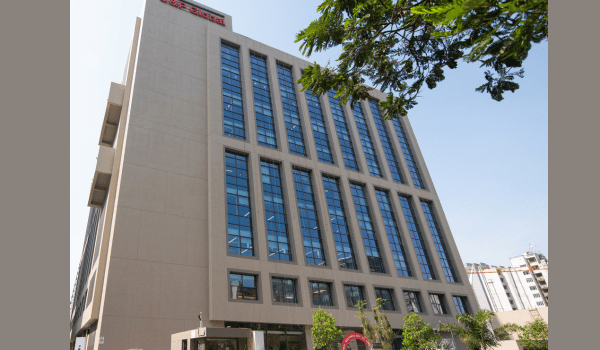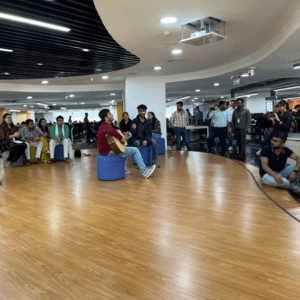S&P Global is a data, research and analytics company that offers essential intelligence, data and analytics to various industries, businesses and governments worldwide. The company has a strength of approximately 33,000 employees globally, and about 13000 are located in India. After changing names periodically based on the portfolios it represented, it finally came to be recognised as S&P Global in the year 2016. After that, the company underwent a sort of rebirth, re-evaluating its philosophy and policies. The primary aim was to bring meaningful changes to the infrastructure, the way it treats employees, including the incentives and reward policies.
The company’s People’s Policy is an iteration aimed at bringing meaningful transformations in terms of overall employee wellness. Recently its 10th version was launched to showcase the successive improvements made over time.
“Every time we made changes to a new iteration, it wasn’t solely about increasing financial resources. It was also about gathering insights from leaders around the world, including all of us, to understand what improvements were needed in our operations. We aimed to address local nuances specific to each region, ensuring that we became a people-first company, infused with empathy in everything we do. This approach was intended to foster respect and purpose in people’s lives,” explains Nilam Patel, MD, India Operations, S&P Global.
Each iteration brought new improvements. For instance, in version 9.0, they focused more on health and wellness, driven by the aftermath of the COVID pandemic. Similarly, the new People’s Policy 10.0 reflects the company’s commitment to DE&I. It introduced many benefits for the employees under this new iteration.
“Every time we made changes to a new iteration, it wasn’t solely about increasing financial resources. It was also about gathering insights from leaders around the world, including all of us, to understand what improvements were needed in our operations. We aimed to address local nuances specific to each region, ensuring that we became a people-first company, infused with empathy in everything we do. This approach was intended to foster respect and purpose in people’s lives.”
Nilam Patel, MD, India Operations, S&P Global
One of the benefits covered under this policy allows expecting mothers the freedom to work from home. The company provides them with transport services to ensure their safety and convenience, eliminating the need for them to risk driving on their own. “Recognising the unique challenges faced by expecting mothers, we aimed to provide an empathetic and supportive atmosphere where they could feel happy and comfortable,” points out Patel.
Along these lines (DE&I approach), the company also established feeding rooms for the new mothers. It focused on employee wellness, offering support for family planning and addressing pregnancy loss through mentorship and policy assistance. These initiatives aimed to create a supportive work environment for employees and their families.
Furthermore, considering the needs of employees following various religions, the company established prayer rooms at the office facility and allowed pet care leaves for employees.
“We have also implemented a pet care initiative, recognising that although pet ownership may not be very common in India, there are still people who prefer to have pets. When employees adopt pets, we offer them leaves so that they can spend more time with their new companions, get accustomed to their habits and understand their behaviour better,” mentions Patel.
A global well-being programme was introduced to focus on supporting the environment. “As part of our environmental, social, and governance or ESG commitment, all our offices are designed to be eco-friendly, with glassware and limited use of virgin plastic. These efforts not only contribute to our net-zero commitment and ESG goals, but also help raise awareness among employees about responsible behaviours outside of the workplace,” clarifies Patel.
Deviating from the sandwich policy, the company has introduced a long weekend policy for the employees. The sandwich policy involves taking leave on both Friday and Monday, essentially using the weekends as leave days. However, the company offers five additional holidays to its employees apart from the seven fixed ones.
The company also provides holidays to all the employees on all festivals and celebrations. Giving an example, Patel explains, “While Diwali is traditionally a Hindu festival, we noticed that many people from various backgrounds enjoy celebrating it. Therefore, we carefully selected several relevant holidays throughout the year based on local preferences. In Delhi, where a significant portion of our workforce resides, we created a localised calendar to ensure that employees fully enjoy their chosen holidays. This approach includes seven fixed holidays and five flexible holidays, covering a list of about 260 days, which incorporates the US and Europe holidays as well.”
By implementing smart policies, the company tries to achieve a happier workforce and save on expenses, enabling themselves to allocate resources to other meaningful initiatives, which was especially valuable during the challenging times of COVID.
The company works to support the lifestyle of its employees too. The ‘wellness policy’ includes five wellness days given to the entire company to support their lifestyle needs. There is also a fixed additional budget to purchase anything related to their mental and physical well-being. “We have a list of exclusions rather than a list of inclusions, meaning that almost anything related to wellness is covered. Whether it’s a yoga session, a trip to the Himalayas, a bicycle, sports attire, or any other wellness-related item or activity, employees have the flexibility to choose what best suits their needs and preferences,” asserts Patel.
The management doesn’t force the employees to spend in any specific way. Instead, employees are encouraged to use their wellness allowance, via reminders three times from July to December. This makes sure that they don’t forget about it. The process of claiming reimbursement is straightforward – employees just need to scan their receipts and load them, without worrying about waiting until the next pay cheque.
“We introduced wellness alarms to remind employees of their unused wellness allowance, and we’re pleased to see that many people are using it. Some employees choose to go to the gym, while others prefer community gyms or other wellness activities. We never question their choices, as long as they are using the benefits for their well-being rather than trying to convert them into additional compensation. It’s all about prioritising their health and happiness,” enunciates Patel.
Patel checks the effectiveness of every policy himself. He explains how, for instance, he follows up with the wellness allowance — “I track how many people are actually utilising this allowance in each month, especially in October, November and December. I proactively communicate and appeal to employees during those months, encouraging them to start using their allowance from January onwards. This is to emphasise that well-being is not a short-term course but a lifestyle. We aim to instil the mindset that maintaining one’s health is a year-round commitment and not limited to just a few months.”
By tracking the number of claims made each month and actively promoting a holistic approach to well-being, the company tries to gauge the effectiveness of the policy and make any necessary adjustments to ensure it continues to support its employees’ overall wellness.
Sick leave patterns are also monitored to see if there are any specific trends, such as an increase in sick leave during the monsoon season or when the weather changes. “By observing these patterns, I can anticipate when my kids may fall sick and plan my travel accordingly, ensuring I’m available when needed. I advise others to do the same, to be prepared for potential sick leaves, particularly when travelling for work,” points out Patel.
Patel pays attention to leave encashment numbers. To prevent it from inadvertently converting into compensation, the company caps the encashment amount and encourages employees to carry forward the remaining leaves for a more extended vacation or use them within the given year. This approach helps employees view the leave benefit as a long-term investment in their well-being rather than a short-term compensation.
S&P Global also takes employee feedbacks while designing all the policies. It follows a culture where people share their ideas and suggestions freely and if someone feels that there should be a policy or improvement in a certain area, they also have the option to reach out to their chief purpose officer or any relevant authority to propose the idea.
“In the process, we constantly review our existing policies to ensure efficient utilisation of resources. We believe in making thoughtful decisions rather than simply pouring more money into policies,” shares Patel.
He goes on to explain, “While we may not receive extraordinary information from the market due to our unique management structure, we consult with experts and advisors to gain external perspectives. Additionally, we have various communication channels, such as town halls, general meetings and leadership catch-ups, where employees can ask questions and share their concerns,” reveals Patel.
These interactions provide valuable insights into areas that require attention, such as office facilities, transportation and cafeteria services. “Not every suggestion may translate into immediate policy changes, but we carefully consider and prioritise the ones that align with our overall goals and objectives,” concludes Patel.





